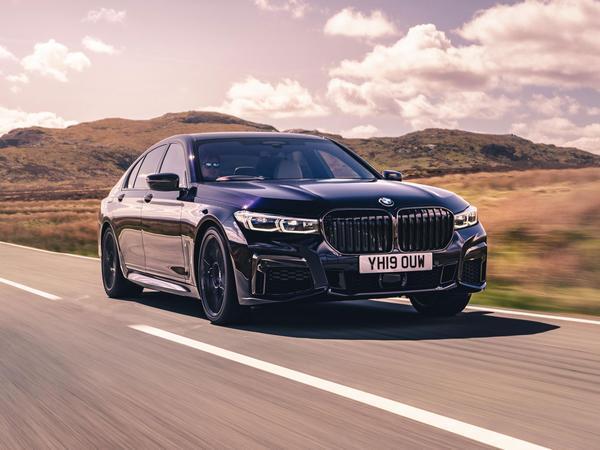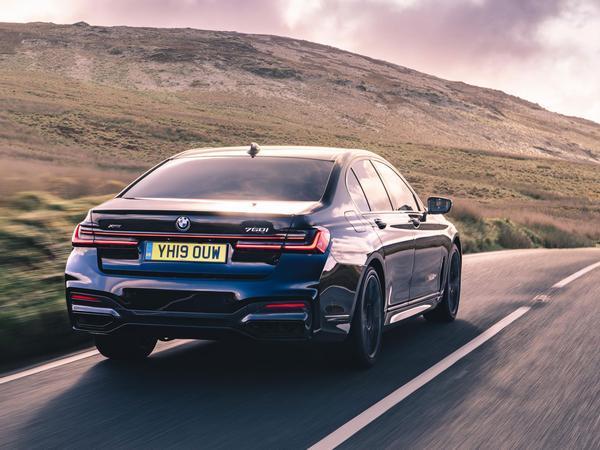The ginormous grille-wearer starts at £69,445; V12 M760Li is £139k…
UPDATE – 16.05.2019
The facelifted BMW 7 Series – you know, the one you can’t miss – has just gone on sale in Britain priced from £69,445, making it five grand cheaper than the lowest-ranking S-Class. That opening salvo is, of course, for the least interesting engine variant, the 730d; the most alluring is the M760Li xDrive range-topper, which has 585hp from a twin-turbo 6.6-litre V12 – but it costs a nostril-flaring £139,000.
The big daddy does, at least, stretch to 5,248mm with a long-wheelbase chassis, although for anyone who doesn’t require acres of legroom, the seemingly smarter choice sits immediately below. Introducing Bavaria’s twin-blower 4.4-litre V8 to the 7 for the first time, the 5,120mm-long 750i xDrive has only 50hp less than the twelve and at 2,040kg, it saves a full 215kg. And, more significantly, it costs £83,875 – or £55k less – and cracks 62mph in four seconds, a delay of only two tenths on the M760Li.
Beneath the aforementioned two variants sits the 745e, BMW’s plug-in hybrid 3.0-litre inline six that can run for up to 36 miles in pure EV mode. It has a combined 394hp and with instantaneous torque on offer, can sprint to 62mph in 5.2 seconds. Stick with the standard rear-drive setup (xDrive’s an option here) and prices for this open at £76,815.
That ranks it at just over £5k above the 740i, which uses BMW’s 3.0-litre six exclusively to offer 340hp. Then there’s the £77,225 740d and that entry 730d, which both use different specification versions of a 3.0 straight-six oil burner to produce 320hp and 265hp respectively. The 30d is claimed to offer up to 44.1mpg combined and emit 138g/km of CO2.
Along with its diverse range of engines and wide-ranging price points, the updated 7 also gets new tech inside, which we run into more detail of in the older story below, as well as that altered elephant-in-the-room exterior design…
ORIGINAL STORY – 16.01.2019
BMW has revealed its updated 7 Series before sales kick off this April, when the car gains a significantly larger front grille to more closely align it with BMW’s other flagship, the X7. The alteration – which is likely to split opinion because, well, see for yourself – comes with a swathe of changes beneath the skin, including a more potent eight-cylinder engine and a higher efficiency plug-in hybrid powertrain.
At the top of the range the M760Li hasn’t escaped modification, with the 6.6-litre V12 model receiving a new particulate filter, as per WLTP’s requirements, resulting in a reduction of peak output to 585hp – a decrease of 25hp. The two-ton car’s 0-62mph time is now four tenths slower at 4.1 seconds, but its CO2 output does, however, drop by 9g/km to 285g, while fuel economy also grows, albeit by a minuscule amount, to 22.6mpg.
These improvements are somewhat overshadowed by the introduction of a new version of BMW’s blown 4.4-litre V8 engine, which is used in the 750i to produce 530hp – 80hp more than before. That, you may have noted, is only 55hp short of the twelve, and the eight is much cleaner in the non long-wheelbase 7, as it puffs out 217g/km and enables a claimed 29.4mpg. You might think it would tread on the toes of the V12, but BMW doesn’t offer this engine in the LWB 7, so its status is safe.
The plug-in hybrid 7, on the other hand, is available in both normal and LWB forms. It’s a crucial model for BMW in an ever more stringent automotive world, and the 2019 changes applied should improve the model’s desirability in cities where zero-emission running is mandatory. The 745 models are now claimed to be capable of up to 134.5mpg and produce as little as 48g/km of CO2. Most significantly, they can eke out up to 36 miles on battery power alone before the petrol inline six-cylinder kicks in.
If you’ve watched demand for diesel cars continue tumble in recent months, you might expect BMW to drop its diesel 7 variants. But sales for DERVs at this end of the market have been more resilient. As such, the 7 will retain three oil burners that span 3.0 and 4.0-litre displacements and each have six cylinders. These variants, the 730d, 740d and 750d, produce between 265hp and 400hp.
There have been no changes to the car’s chassis, which comes as standard with adaptive damping and two-axle air suspension with self-levelling. But the already generous driving assistance technology suite has now grown to include a reversing assistant, which can steer the car back up to 50 metres along exactly the line it travelled when going forwards.
Inside, BMW’s latest infotainment system, Live Cockpit Professional, is standard and includes a 12.3-inch instrument cluster display with a 10.25-inch touchscreen. Drivers can, if they want, still control the system with BMW’s highly effective rotary controller or voice operation – which can be activated with “hey BMW”. Oh, and the car’s side windows are 5.1mm thicker, for added insulation. Joy.
Source: Read Full Article















